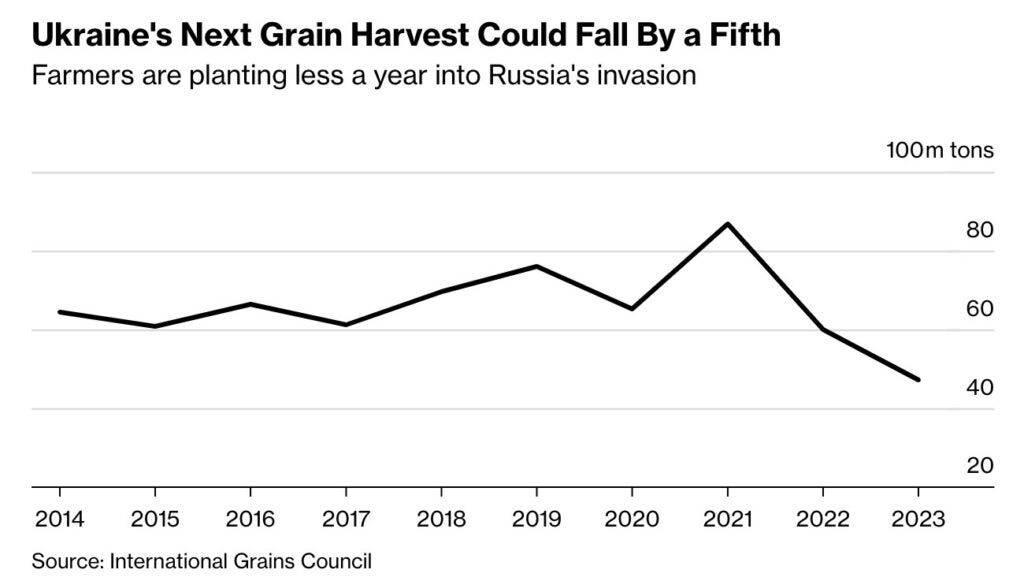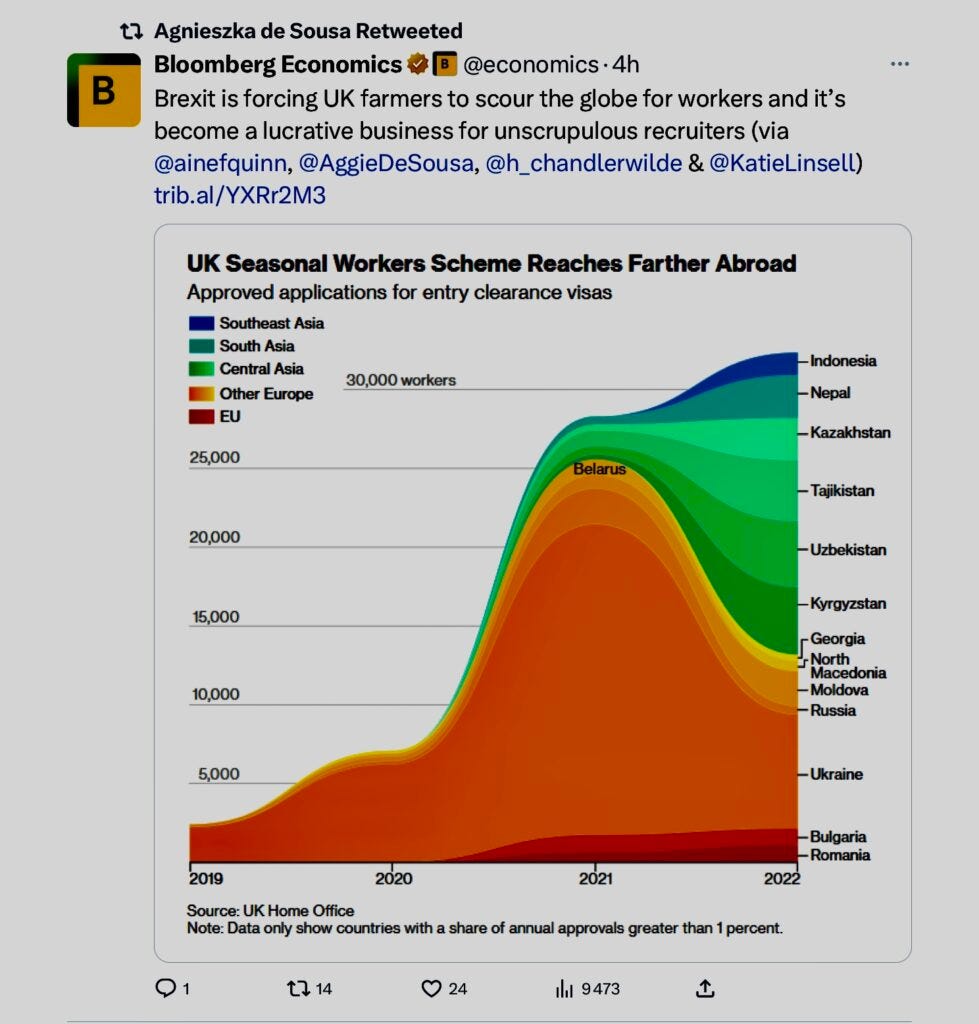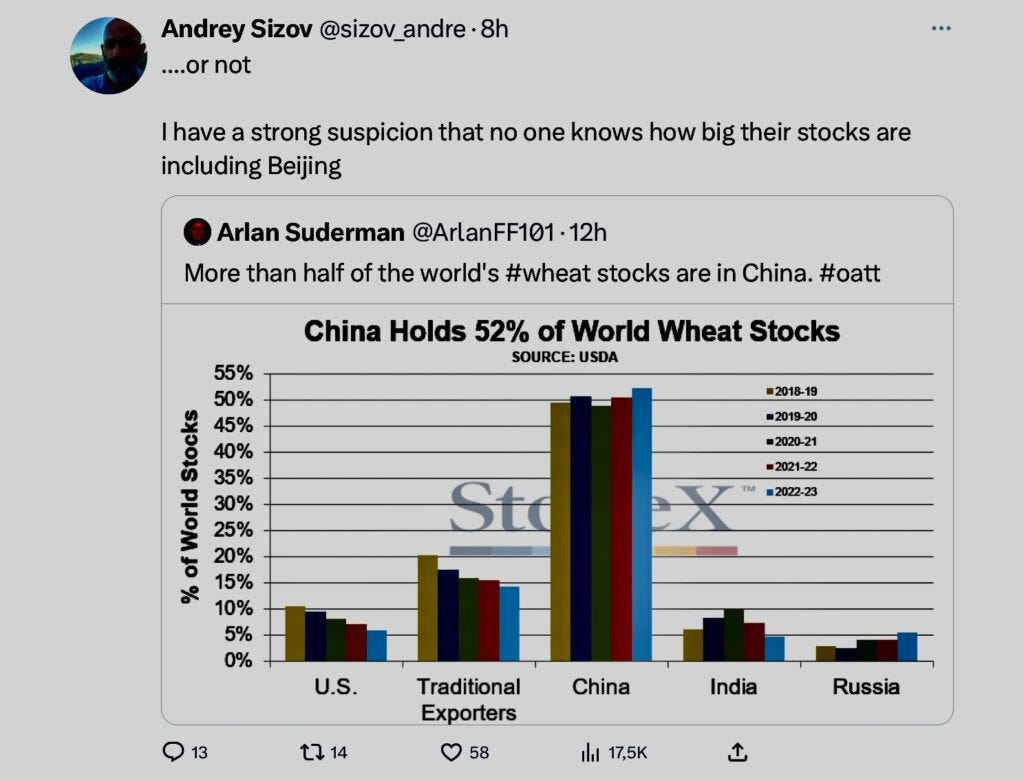Ag-trader News
Ukraine war
Traders were caught a little off balance last week by a report that Russia could temporarily halt wheat and sunflower exports after a sharp drop in global prices.
Reuters quoted a source as saying that the government has asked exporters to set a wheat export price of not lower than $275 per tonne "until further notice".
Traders were already confused about the Black Sea grain corridor extension. Ukraine says it has been extended for 120 days, while Russia says it is only for 60 days.
Russia has laid out their conditions for agreeing to any further extension, including restoring access to the SWIFT system for state-owned agriculture-focused bank Rosselkhozbank, resumption of farm machinery supplies, and unblocking foreign assets and accounts held by Russian agricultural companies.
The FT has an excellent long read on how Russia’s invasion has destroyed significant parts of Ukraine’s grain export infrastructure.
Ukraine’s farmers are planting less acreage than last year. The International Grains Council forecasts Ukraine’s grain output at 47 million mt, about half its pre-war level. The government has warned that the 2023 combined grain and oilseed harvest could fall to 63 million mt, down from 70 million mt harvested in 2022. The good news is that the winter grain crops are in a good-excellent state.
The European Commission has proposed allocating €56 million from the EU budget to help Poland, Bulgaria, and Romania cope with increased imports of cereals and oilseeds coming from neighbouring Ukraine. Ukraine’s exports have particularly hurt Romania’s farmers.
Other market news
The La Niña weather phenomenon has officially ended, but there is a 50 per cent possibility that an El Niño event could form later this year.
The UK’s annual food price inflation hit 18 per cent in February, the highest level since the 1970s, pushing the Consumer Prices Index up by 10.4 per cent compared to a year earlier. The price of Bloomberg’s basket of English breakfast items soared past £35, an increase of more than 22 per cent from a year earlier.
A Brexit-induced farm labour shortage is partly to blame for the rise.
The Indonesian government has approved a variety of GM wheat for human consumption designed to resist drought better. In a long read, World-Grain asks whether GM wheat has a future in the US.
Biofuels
The UK government plans to eliminate import tariffs on palm oil from Malaysia, the price of joining the Comprehensive and Progressive Trans-Pacific Partnership (CPTPP).
Bloomberg fears that a global biofuel boom could lead to a shortage of vegetable oils.
Chevron has announced a collaboration with Corteva and Bunge to produce renewable diesel from canola. The joint venture will plant as many as 10 million additional acres of canola in the southern US.
Big companies are abandoning research into producing biodiesel from algae, but the BBC wonders whether kelp has a future in sustainable aviation fuel.
Company News
Bunge has made it into the S&P 500, replacing the ill-fated Signature Bank.
Louis Dreyfus Company (LDC) reported a 44 per cent jump in 2022 net profits to just over $1 billion from $697 million in 2021. Net sales rose almost 21 per cent to $59.9 billion from $49.6 billion.
Viterra posted a record EBITDA of $2.65 billion for the 2022 calendar year, a 21 per cent increase from the previous year. Revenue increased 35 per cent to $54 billion.
Container shipping companies have been in the spotlight, paying billions of dollars in dividends following last year’s record profits.
Animal Farm
China has agreed to resume imports of Brazilian beef and approved four new beef packers. Brazil voluntarily halted exports to China on 23rd February after discovering an atypical case of mad cow disease.
Meanwhile, a surge in African swine fever infections in China could reduce domestic pork production.
Switzerland has reported a case of mad cow disease - bovine spongiform encephalopathy (BSE) - in the eastern region of Grisons. The relevant authorities classified the case as atypical.
Avian influenza’s spread through Europe’s poultry flocks has eased, but authorities are concerned that cases may rebound as wild birds migrate in spring.
The Environment
The latest IPCC climate report paints a stark picture of the world’s food systems, but solutions exist.
Are we facing phosphogeddon? Some scientists warn that the misuse of phosphorus could lead to a shortage of fertilisers. However, the problem may be solving itself. We may already have reached peak fertiliser. Microbes and regenerative agriculture might accelerate the move away from fertiliser.
Paraquat, banned in more than 50 countries, including the EU, China, and Brazil, is still one of the most popular herbicides in the US. It will go on trial in October, accused by more than 3,000 farmers of contributing to their Parkinson’s disease.
European lawmakers have finally agreed on a timeline for the EU’s plan to cut pesticide use, which leaves a final deal on the file unlikely in 2023.
In a long read, the FT argues that rich nations are not looking good in the debate over palm oil. They are also behind on their plan to plough $1 billion into soybean and cattle farming free of deforestation in threatened South American ecosystems by 2025.
PepsiCo’s chief sustainability officer has warned that half of the world’s population will face water scarcity as soon as 2025.
A study published in Nature shows that cradle-to-grave emissions from food loss and waste represent half of total greenhouse gas emissions from food systems. If correct, it might mean that the best – and easiest - way you can help the environment is to stop throwing food away.
The FT has a different take. It writes that selling your SUV is the best way to help the environment is to sell your SUV.
Nutrition and Health
Nestlé says less than half of its mainstream food and drinks are considered healthy.
It is ironic – and perhaps inevitable - that Novo Nordisk, the maker of the weight-loss drug, Wegovy, is now worth more than Nestlé SA, the world’s biggest food company.
But why do we like unhealthy and fattening foods so much? A new study published in Neuroscience News attempts to answer that question, while the New Scientist explains why people regain weight after dieting.
© Commodity Conversations® 2023
Many of the above links require subscriptions. Please support quality journalism.




